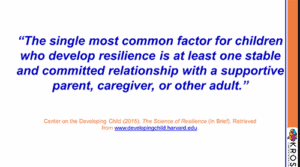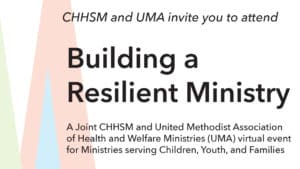First-Ever CHHSM/UMA Webinar for Child, Youth, and Family Service Ministries Provides Inspiration, Practical Tools for the Future

Innovative tools for helping nonprofit outreach with children, youth and families were the focus of a first-ever joint webinar Aug. 11 from the UCC Council for Health and Human Service Ministries (CHHSM) and sister organization the United Methodist Association of Health and Welfare Ministries (UMA). “Building a Resilient Ministry” featured a keynote address by career child advocate Frank Kros, whose lecture to the almost 70 attendees covered resilience-building practices applicable to both direct service providers and their managers.
“Frank’s message of resilience certainly applies to the children and youth we serve, but also to their families, and to the people who work in children, youth, and family service organizations,” said Michael J. Readinger, president and CEO of CHHSM. “I also see applications of his resilience model in other service sectors. The presentation was very good!”
The two-hour event also included a panel discussion featuring Adalay Wilson, vice president of programs, United Methodist Family Services in Richmond, Va.; and Chris Cox, president and CEO of Hoyleton Youth and Family Services in Fairview Heights, Ill. The discussion was moderated by Mary Kemper, president and CEO of UMA.
Kros’ address was two-pronged, aimed at helping equip direct service workers with tools to help children and youth build resiliency, but also at leaders of organizations within the two faith-based human service ministries. The same resiliency skills that traumatized youth and children need also are needed by the adults who serve them, he said, and emphasized that leadership needed to expand ways to help employees find well-being, just as the employees help the children and youth to do the same. “True well-being,” said Kros, comes with an “underlying sense of happiness, love and peace.”

During his presentation, Kros introduced a rubric to help care providers focus on the essentials of building resiliency. The elements required for developing resilience include physical, emotional, and social safety; being and feeling seen and wanted; feeling competent; and having opportunities to contribute to individuals, peer, and community relationships.
Kros outlined ways to help youth and their care workers achieve each of the elements. He focused attention on helping staff members see the importance of communicating in a way that shows the youth they are unconditionally accepted. Too often, he said, we provide positive feedback only when a youth is compliant with a rule. It must be unconditional, he said, in order to help the youth to feel seen and wanted.
“I found the resilience in trauma training from a practitioner point of view to be very enlightening,” said panelist Cox following the webinar. “This broadened my view of what we have been doing for years, and I found a number of pieces complementary to our current work and helpful in framing broader conversations.”
One aspect of Kros’ talk — as well as of the panel discussion that followed — dealt with how the same resilience skills are necessary for adults providing care. In working with youth, Kros said, “you’re working with trauma on a daily basis. You will experience secondary stress, vicarious trauma” and more. “You need resilience, too!”
Following the keynote, the panel discussion discussed the changes their organizations are facing because of the ongoing COVID-19 pandemic, as well as how the concepts presented by Kros might resonate with their organizations.
“The past 17 months have challenged our leadership and followership,” said Wilson about her Richmond, Va.-based ministry. “We’ve discovered we’re more resilient than we even realized!”
She cited increased collaboration and communication, along with expedited decision making as two of the unexpected benefits of the change and adaptation during COVID.
For Cox, one of the bright spots of the pandemic involved the Hoyleton employees. “Staff stepped up in ways we never would have given them the opportunity for prior to the pandemic,” he said. They are “committed to the mission and ministry and young people they work with, and continue to show up every day.”
Cox cited the ongoing challenge —exacerbated by COVID — of recruiting and retaining quality staff, particularly in times of limited payment streams. Kros responded that there are non-monetary ways to help staff, including taking the time to really getting to know them and convey that they are valued and important.
“Leaders need to understand that those doing face-to-face care experience trauma, too, and need to support those staff members in a variety of ways, including education. It does not take away from people having the time to do their jobs, or cost a lot” to be prepared to help employees, Kros said.
The importance of knowing staff resonated with attendee Kyle Zanker, chief development officer at Crossroad Child & Family Services in Fort Wayne, Ind. “It’s not just about knowing their name and what they do, but it shows you care about them when you get to know more about them,” she said. “Making sure staff know you care and are interested in them can make such a difference all the time, but especially in times of stress and change.”
Kros also discussed using the phrase personal resilience instead of self-care. “Personal resilience is a better phrase than self-care,” he said, adding that the phrase “personal resilience” reframes the situation. For example, self-care can create internal tension for an employee who might not want to let other people down, or thinks that taking time for self-care is self-indulgent.
“Resilience is built on a day-to-day basis in small increments,” Kros said. “Vacations are great and will help, but you also need resilience built gradually, day-to-day.” Direct service workers need to build resilience with their clients, while leaders of those workers need to help them build their own resilience. “Both are necessary in our ministries,” he added.

Such changes already are underway at both United Methodist Family Services and Hoyleton. Wilson cited health care and metal health benefits for workers and their families, while Cox discussed a new program submitted by a committee including direct support staff focusing on physical, emotional and spiritual well-being.
“We will be intentional about adapting our practice models to include the information from Frank,” said Cox. “We must pull back and be intentional about modifying our practice model, including expectations on coworkers.”
“Having those conversations with staff is the first step,” said Kros. “The limitation of finance is really difficult — a barrier to what you’re able to pay.” But “opportunity for growth is important for staff — it doesn’t take a lot of money for a leadership development track” at an organization.
Kros emphasized that one of the best ways to support staff is by advocating for them in the local community and in government circles. “Teach the community that the people serving your children are paid less than those who work at Walmart,” he said. “Advocate for them to the community and government.”
“I truly related to the affirmative shaking of heads when it was mentioned that we, as not-for-profit human service providers, all need to do a better job of teaching our communities that many of the most important staff members we employ — who are doing front-line, challenging mission work — are paid less now than people who are working front-line jobs in large retail supercenters,” said Zanker.
The first-ever joint webinar from CHHSM and UMA received positive reviews from those in attendance. The event “was fantastic,” wrote one attendee. Another remarked, “It was good to hear a conference that related to foster care and residential.” A third highlighted the keynote, saying, “Frank Kros’ presentation was very well put together, informative, and I will be utilizing some of the things that I learned from this presentation as I am working with my team.”
For the Rev. George Graham, vice president of CHHSM, the timing of the webinar couldn’t have been better. “As we move into a new school year and a new season of uncertainty about COVID-19, I was glad to have the opportunity to focus on ways to build resilience in youth as well as in people who work with them,” he said.
The webinar’s attendees came from human service providers from across the country. “I am so grateful for the opportunity to share with and learn from other faith based organizations,” said Cox. “We have such a rich history and commitment to our ministries. Having the opportunity to share with one another always strengthens our collective work and importance in our communities.”
Mary Kemper, president and CEO of UMA, summed it up best. “We were thrilled to partner with our colleagues at CHHSM, and to have the opportunity for our mutual ministries to learn together,” Kemper said. “Frank Kros’ presentation and the following discussion of peers really hit home for so many of our providers. In this time of uncertainty, we know our children and youth are struggling to find a sense of safety and security. This was a wonderful opportunity for our ministries to learn key take-aways and strategies to address this challenging environment.”
The full slide presentation accompanying Kros’ address has been made available to all attendees. Those attending the full webinar also had the opportunity to earn two NASW CEU credits.
Join Our Mailing LIst
"*" indicates required fields
Follow on Facebook
Denise Buck to Succeed Campbell as IFM CEO - CHHSM
www.chhsm.org
As IFM Community Medicine (IFM) Founder and CEO David Campbell M.D. plans to retire mid-year, his successor, Denise Buck M.D., has started working full-time with IFM in St. Louis. Before assuming this...